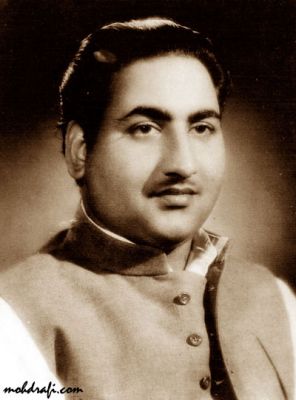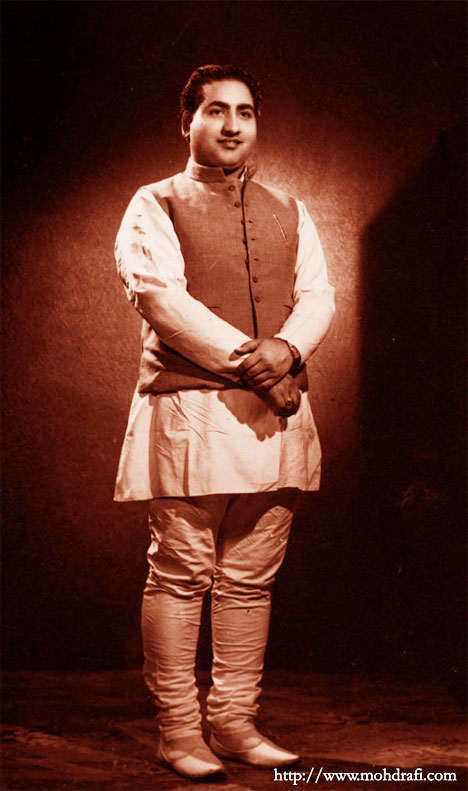FOREVER MOHD RAFI:

THE FINAL YEARS:
Kishore Kumar overshadowed Rafi as the most sought-after singer in Bollywood in 1970s, starting with the film Aradhana (1969). The music for Aradhana was composed by S. D. Burman, and he had used Rafi as the male playback voice for the first two recorded duets, Baaghon Mein Bahaar Hai and Gunguna Rahen Hain Bhanwre. After these two recordings, S D Burman fell ill and his son and assistant, R D Burman, took over the recordings. R D Burman got Kishore Kumar to sing the solos Roop Tera Mastana and Mere Sapnon Ki Rani, which led to Kishore Kumar's popularity. Kishore Kumar's rise and R D Burman's patronage to him sidelined Rafi's career in early 1970s. Some also say that Rafi was advised against singing at the Hajj Pilgrimage, so he deliberately spent the next few months away from the recording studios by living in London.</h6>
From 1970-1976, Rafi's output was less, but he sang several hit songs during this period. Some of his hit songs in early 1970s were with music directors like L-P, Madan Mohan, R. D. Burman and S. D. Burman. Some of Rafi's popular songs from this period include Yeh Duniya Yeh Mehfil from Heer Ranjha (1970), Chura Liya Hain Tumne from Yaadon Ki Baarat, Yeh Jo Chilman Hain and Itna to Yaad Hain Mujhe from Mehboob Ki Mehndi, Tum Jo Mil Gaye Ho from Hanste Zakhm (1973), Gulabi Aankhen from The Train, Aaj Mausam bada Beimaan hai from Loafer (1973), and Jhilmil Sitaron ka from Jeevan Mrityu (1974).
Rafi made a comeback as a leading playback singer in mid-1970s. In 1974, he won the Film World magazine Best Singer Award for the song Teree Galiyon Mein Na Rakhenge Qadam Aaj Ke Baad (Hawas) composed by Usha Khanna. In 1977, he won both Filmfare Award and the National Award for the song Kya Hua Tera Wada from the movie Hum Kisi Se Kum Nahin, composed by R. D. Burman. Rafi did playback for Rishi Kapoor in films like Amar Akbar Anthony (1977), Sargam (1979) and Karz (1980). The qawwali Pardah Hai Pardah from Amar Akbar Anthony (1977) was a superhit. Rafi gave many other hit songs in late 1970s, notably for the films Laila Majnu (1976), Apnapan (1978), Qurbani, Dostana (1980) and The Burning Train (1980).
On Thursday, July 31, 1980 after composing the song Shaam phir kyun udaas hai dost for the movie Aas Paas with Laxmikant-Pyarelal (L-P), Rafi asked if he could leave for home. L-P were surprised because Rafi would be the last person to leave the recording session. While leaving, Rafi said once again "OK. I will leave." Rafi died at 10.50 p.m. on the same day due to a massive heart attack. His funeral procession was one of the largest Mumbai ever witnessed.The whole Indian nation mourned his death for a long time and there was public holidays for two days in his honor. Shammi Kapoor, who was shooting outside Mumbai, rushed back to attend his funeral in Mumbai. Later, the Padma Shri Mohammed Rafi Chowk in the Bandra suburb of Mumbai was named after him.



 Sometime ago, a Bangladeshi musician claimed that Mohammad Rafi was not given his rightful due in India. In a week-long series rediff.com finds out if the great Rafisaab was indeed ignored by the Hindi film industry and the government.
Sometime ago, a Bangladeshi musician claimed that Mohammad Rafi was not given his rightful due in India. In a week-long series rediff.com finds out if the great Rafisaab was indeed ignored by the Hindi film industry and the government. Last week, a Bangladeshi musician claimed that Mohammad Rafi was not given his rightful due in India. In a week-long series rediff.com finds out if the great Rafisaab was indeed ignored by the Hindi film industry and the government.
Last week, a Bangladeshi musician claimed that Mohammad Rafi was not given his rightful due in India. In a week-long series rediff.com finds out if the great Rafisaab was indeed ignored by the Hindi film industry and the government.
